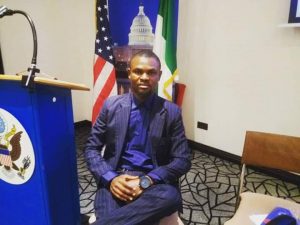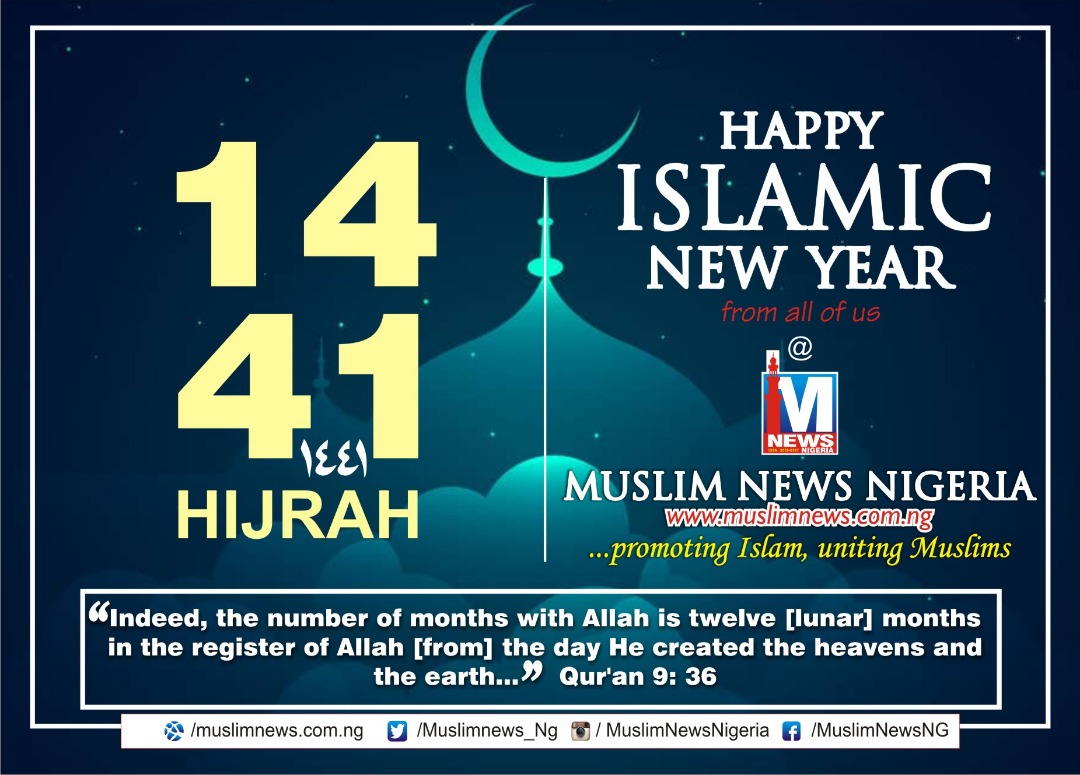Some 1,441 years ago, the best man to ever set foot on mother earth, Muhammad the son of Abdullah (peace be upon him), was driven out of Makkah, his city of birth, for calling to the servitude of the One and Only Creator, Allah (SWT) by his tribesmen, the Quraysh.
Today, September 1, the over 2 billion Muslims worldwide who embrace the universality of Prophet Muhammad’s message are commemorating the beginning of the Islamic New Year, Hijrah 1441 A.H.
Literally, Hijrah means movement from one place to another, including the movement of persons in search of provisions.
Technically, it represents the holy migration of Prophet Muhammad (peace be upon him) from Makkah to Yathrib (later renamed Madina Al-Munawara, the City of Light), when he (Muhammad) was faced with hostility and his Companions (may Allah be pleased with them) were being persecuted by the Quraysh, the unbelievers in Makkah.
Allah instructed him to leave Makkah for Madina, with a distance of about 350 kilometres between the duo, as a form of solace.
The Hijrah, which corresponded to 622 C.E, was a turning point in the history of Islam and the world generally. It was the beginning of the establishment of the Islamic State, which is in no way similar to Daesh’s nebulous contraption the West has hypocritically named “Islamic State”, in a bid to give the term a bad name, with no aim other than to hang it before the court of global opinion.
The Hijrah could only have proceeded due to the immense efforts of the Ansar (the Helpers of Islam), who welcomed the Prophet and the Muhajirun (those that emigrated with him) to the City of Light.
They built for the Prophet a home and mosque, which is today known as Al-Masjid an-Nabawi, the second holiest mosque of Islam after the Ka’bah, which was then under the protection of the Quraysh.
The Prophet received a heroic welcome. The joy of the Ansar (the helpers) knew no bounds, as they rejoiced at the arrival of the Messenger of Allah with series of nasheed (Islamic poems).
Years later, Allah gave the Muslims victory over the Quraysh. It was a bloodless conquest and hundreds of Makkans-including the Quraysh hardliners-willingly embraced Islam.
Soon after, Islam spread beyond the Arabian Peninsula to every nook and cranny of the world, even to the most remote corners of China, among the Buddhists and the Taoists. This was the promise of Allah, “And We have not sent you (O Muhammad) except as a bringer of glad tidings and a warner unto all humanity.” Q. 34: 28
The Hijrah was of great significance to the early Muslims. Thus, it was easy for the Companions of the Prophet to unanimously adopt the Hijrah as the beginning of the Islamic calendar during the era of Umar Bin Khattab, the second Caliph of Islam, years after the demise of Prophet Muhammad and AbuBakr, the first Caliph.
Sahl ibn Sa’d, narrated in the collection of Imam Bukhari (Hadith 3934) that “they did not start the calendar from the beginning of the Prophet’s mission or from his death; they only started it from the time of his arrival in Madina”.
According to sound Islamic belief, Hijrah is not a festival but a period of reflection on how the Prophet and his Companions sacrificed their lives and property for Islam.
Evidently, Muslims have only two festivals (Eid-el-Fitr and Eid-el-Adha), but there is nothing wrong if the Muslim world uses the occasion of the Hijrah to create global awareness about the commencement and significance of the Islamic calendar.
In his biography of Prophet Muhammad, Khalifah Sikirullah Balogun affirmed that; “When the Prophet reached Madina, the people started saying, “the Prophet of Allah has come! The Prophet of Allah has come!” as they looked up to him.
It was a day of wondrous felicity and happiness, a day of immense joy in the history of Madina. People were dressed in gorgeous clothes. It was a day on which business was set aside to honour the Prophet, a day of holiday and exuberant celebrations; the day when Islam wore its flag and came out openly to the world, unlike in Makkah where Islam was under the shadow of the unbelievers.”
These are the reasons why declaring the Hijrah public holiday is a welcome idea, and we commend states like Osun, Kano and Sokoto for declaring Friday and tomorrow, Monday Hijrah public holiday to commemorate the Islamic New Year.

We also call on the Federal Government and other States of the Federation to adopt the Hijrah holiday in the interest of unity, peace and love among members of different religious groups in Nigeria.
If the Federal Government could declare a public holiday for Nigerian Christians to join the rest of the world to celebrate the Gregorian calendar year, then it is incumbent upon the same government to declare a public holiday for Muslims to acknowledge the commencement of their new year.
Declaring the Hijrah public holiday is one of the foremost contemporary ways to highlight its significance. If public holidays are declared to signpost the significance of national days, if such is done to acknowledge the greatness and moral values of some personalities, why will it be less important to do so for arguably the most important day in the history of Islam; the day Muslims got liberated from the darkness of Kufr (disbelief) to the light of Islam; the day Islam secured its liberation from the Army of Shaytan, became firmly rooted in Madina and blossomed to the entire world.
While we agree that declaring a holiday alone is not the ultimate, granting it will neither make the Hijrah unIslamic nor diminish its significance. It will only add value to its essence. It will give Muslims the time to ponder on its lessons.

– Rasheed Abubakar, Publisher, Muslim News
Muslim News – a publication of Rawshield PR Media, is a mouthpiece for underreported Muslim achievers and events in Nigeria and across the world, which are never given prominence in the mainstream media.
Our Mission: To give special media attention and coverage to important people and events in the life of Muslims that do not gain mainstream media attention, and to change the media narrative of blaming Islam and Muslims for offences committed in its lofty name.
Editorial Policy: We shall be fair to all persons, irrespective of their religions and ideologies, as long as that promotes the image of Islam and unites the Muslims. We shall also uphold the ethical standards of journalism.


